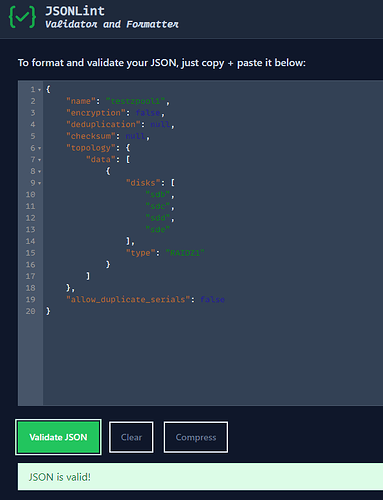I’m attempting to use the API to create a RAIDZ1 pool of 4 disks.
Truenas Scale: Dragonfish-24.04-RC.1
{
"name": "testzpool1",
"encryption": false,
"deduplication": null,
"checksum": null,
},
"topology: {
"data": [
{
"disks": ["sdb", "sdc", "sdd", "sde"],
"type": "RAIDZ1"
}
},
"allow_duplicate_serials": false
}
The job result has an error
ValidationErrors: [EINVAL] pool_create: A dict was expected
id : 2470
method : pool.create
arguments : {
{
"name": "testzpool1",
"encryption": false,
"deduplication": null,
"checksum": null,
},
"topology: {
"data": [
{
"disks": ["sdb", "sdc", "sdd", "sde"],
"type": "RAIDZ1"
}
},
"allow_duplicate_serials": false
}}
transient : False
description :
abortable : False
logs_path :
logs_excerpt :
progress : @{percent=0; description=; extra=}
result :
error : [EINVAL] pool_create: A dict was expected
exception : Traceback (most recent call last):
File "/usr/lib/python3/dist-packages/middlewared/job.py", line 469, in run
await self.future
File "/usr/lib/python3/dist-packages/middlewared/job.py", line 511, in __run_body
rv = await self.method(*args)
^^^^^^^^^^^^^^^^^^^^^^^^
File "/usr/lib/python3/dist-packages/middlewared/service/crud_service.py", line 210, in nf
rv = await func(*args, **kwargs)
^^^^^^^^^^^^^^^^^^^^^^^^^^^
File "/usr/lib/python3/dist-packages/middlewared/schema/processor.py", line 47, in nf
res = await f(*args, **kwargs)
^^^^^^^^^^^^^^^^^^^^^^^^
File "/usr/lib/python3/dist-packages/middlewared/schema/processor.py", line 186, in nf
args, kwargs = clean_and_validate_args(args, kwargs)
^^^^^^^^^^^^^^^^^^^^^^^^^^^^^^^^^^^^^
File "/usr/lib/python3/dist-packages/middlewared/schema/processor.py", line 180, in clean_and_validate_args
verrors.check()
File "/usr/lib/python3/dist-packages/middlewared/service_exception.py", line 70, in check
raise self
middlewared.service_exception.ValidationErrors: [EINVAL] pool_create: A dict was expected
exc_info : @{repr=ValidationErrors(); type=VALIDATION; extra=System.Object[]}
state : FAILED
time_started : @{$date=1712608164000}
time_finished : @{$date=1712608164000}
credentials : @{type=API_KEY; data=}
any ideas what I have wrong?
Here’s the powershell script
function Invoke-TrueNASAPI {
param (
[string] $method,
[string] $url,
[object] $body = $null
)
$apiKey = "{yourapikey}"
$apiUrl = "https://{yourtruenasip}/api/v2.0"
$headers = New-Object System.Net.WebHeaderCollection
$headers = @{
accept="*/*"
Authorization="Bearer $apiKey"
}
add-type @"
using System.Net;
using System.Security.Cryptography.X509Certificates;
public class TrustAllCertsPolicy : ICertificatePolicy {
public bool CheckValidationResult(
ServicePoint srvPoint, X509Certificate certificate,
WebRequest request, int certificateProblem) {
return true;
}
}
"@
[System.Net.ServicePointManager]::CertificatePolicy = New-Object TrustAllCertsPolicy
[Net.ServicePointManager]::SecurityProtocol = [Net.SecurityProtocolType]::Tls12
$contentType = "application/json"
if ($body) {
$body = ConvertTo-Json $body
}
Invoke-RestMethod -Uri "$apiUrl/$url" -Method $method -Headers $headers -UseBasicParsing -ContentType $contentType -Body $body
}
Invoke-TrueNASAPI -method Get -url "system/info"
# Get information on all disks
Invoke-TrueNASAPI -method Get -url "disk"
# Get information on all pools
Invoke-TrueNASAPI -method Get -url "pool"
###################################################################################################
####show unused disks
<#
$disks = Invoke-TrueNASAPI -method Get -url "disk"
$poolDisks = @()
foreach ($disk in $disks) {
$diskId = $disk.identifier # Store disk identifier
$poolUrl = "pool?filter=disks+like+'$diskId'" # Construct API endpoint URL
$poolsWithDisk = Invoke-TrueNASAPI -method Get -url $poolUrl
if ($poolsWithDisk) {
$poolDisks += $disk
}
}
$unusedDisks = $disks | Where-Object { -not $poolDisks.Contains($_) }
Write-Host "Unused Disks:"
Write-Host $unusedDisks
#>
###################################################################################################
####create z1 pool of unused disks
#helpful ref: https://www.truenas.com/community/threads/creating-a-pool-with-the-api-v2-0.106495/
# Create ZFS pool (RAID-Z1)
$createPoolResponseID = Invoke-TrueNASAPI -Method Post -url "pool" -Body @('
{
"name": "testzpool1",
"encryption": false,
"deduplication": null,
"checksum": null,
},
"topology: {
"data": [
{
"disks": ["sdb", "sdc", "sdd", "sde"],
"type": "RAIDZ1"
}
},
"allow_duplicate_serials": false
}')
$joburl = "core/get_jobs/?id=" + $createPoolResponseID
Invoke-TrueNASAPI -method Get -url $jobUrl
here are the disks
identifier : {serial_lunid}6000c290b4c69e24f1189f61362e1fbf_6000c290b4c69e24
name : sda
subsystem : scsi
number : 2048
serial : 6000c290b4c69e24f1189f61362e1fbf
lunid : 6000c290b4c69e24
size : 42949672960
description :
transfermode : Auto
hddstandby : ALWAYS ON
advpowermgmt : DISABLED
togglesmart : True
smartoptions :
expiretime :
critical :
difference :
informational :
model : Virtual_disk
rotationrate :
type : SSD
zfs_guid :
bus : SCSI
devname : sda
enclosure :
supports_smart :
pool :
identifier : {serial_lunid}6000c294a3f7274f18f241e7f33a4c1b_6000c294a3f7274f
name : sdb
subsystem : scsi
number : 2064
serial : 6000c294a3f7274f18f241e7f33a4c1b
lunid : 6000c294a3f7274f
size : 107374182400
description :
transfermode : Auto
hddstandby : ALWAYS ON
advpowermgmt : DISABLED
togglesmart : True
smartoptions :
expiretime :
critical :
difference :
informational :
model : Virtual_disk
rotationrate :
type : SSD
zfs_guid : 7678729438661677905
bus : SCSI
devname : sdb
enclosure :
supports_smart :
pool :
identifier : {serial_lunid}6000c29b9222c11399de609b7495b36c_6000c29b9222c113
name : sde
subsystem : scsi
number : 2112
serial : 6000c29b9222c11399de609b7495b36c
lunid : 6000c29b9222c113
size : 107374182400
description :
transfermode : Auto
hddstandby : ALWAYS ON
advpowermgmt : DISABLED
togglesmart : True
smartoptions :
expiretime :
critical :
difference :
informational :
model : Virtual_disk
rotationrate :
type : SSD
zfs_guid : 15510185469459324292
bus : SCSI
devname : sde
enclosure :
supports_smart :
pool :
identifier : {serial_lunid}6000c297d67d56672a1888de59e8fcf7_6000c297d67d5667
name : sdc
subsystem : scsi
number : 2080
serial : 6000c297d67d56672a1888de59e8fcf7
lunid : 6000c297d67d5667
size : 107374182400
description :
transfermode : Auto
hddstandby : ALWAYS ON
advpowermgmt : DISABLED
togglesmart : True
smartoptions :
expiretime :
critical :
difference :
informational :
model : Virtual_disk
rotationrate :
type : SSD
zfs_guid : 7451886028752644964
bus : SCSI
devname : sdc
enclosure :
supports_smart :
pool :
identifier : {serial_lunid}6000c29b2c17271f31418694d3ef8d45_6000c29b2c17271f
name : sdd
subsystem : scsi
number : 2096
serial : 6000c29b2c17271f31418694d3ef8d45
lunid : 6000c29b2c17271f
size : 107374182400
description :
transfermode : Auto
hddstandby : ALWAYS ON
advpowermgmt : DISABLED
togglesmart : True
smartoptions :
expiretime :
critical :
difference :
informational :
model : Virtual_disk
rotationrate :
type : SSD
zfs_guid : 9432486293175599696
bus : SCSI
devname : sdd
enclosure :
supports_smart :
pool :
